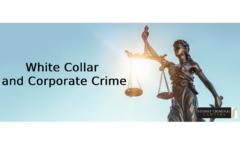Is There a Difference Between White Collar Crime and Corporate Crime?

The terms white collar crime and corporate crime are often used interchangeably and there are situations where a single act can fall into both categories, as well as offences that can be classed as both white collar and corporate crimes.
And while both categories encompass non-violent offences for a benefit, enrichment, advantage or other gain, there is a difference between the two.
The difference between white collar and corporate crime
White collar crime is generally carried out by individuals against, or in the context of associations with, corporations or businesses for the individual’s personal gain, whereas corporate crime is engaged in by a company’s directors, employees or agents for the benefit of the company.
White collar crimes
Offences that are generally considered white collar crimes include tax fraud (knowingly making a false representation to the ATO), tax evasion (which many include omitting income from a tax return or wrongly claiming a deduction), Centrelink fraud, insurance fraud, identity theft, embezzlement, larceny by a clerk or servant, insider trading, blackmail, bribery, money laundering and dealing in proceeds of crime.
These are usually committed by individuals against, or in the context of relationships with, companies and other businesses or organisations, for personal gain.
Corporate crimes
Offences that are normally considered to be corporate crimes include cartel activity, market manipulation, environmental crimes, false advertising and breaches of regulatory requirements.
These are usually committed by the directors, employees or agents of companies for the benefit of the company.
Penalties
Penalties that generally apply to white collar crimes include fines levied against the individual, good behaviour bonds such as conditional release orders, community correction orders and intensive correction orders, and potential prison sentences.
Penalties that can apply to corporate crimes include fines levied against the company, injunctions to perform or refrain from engaging specified conduct, and various other declarations, enforceable undertakings and orders which can range from the regulation of the company’s affairs, to the relinquishment of ill-gotten gains, to disqualification orders against directors and managers, to the appointment of managers or receivers, to the the compulsory winding up of companies.
Overlap between offences
There are situations where offences that are generally categorised as corporate crimes can also amount to white collar crime, and vice-versa.
An example of this is where a company director who owns a large number of shares engages in cartel activity, market manipulation or another dishonest practice to increase profits, obtain new investment and/or increase the value of shares.
This is a situation which can, at least in the short term, produce a benefit for the company (through higher profits and/or new investment) as well as the director (by increasing the value of held shares).
The director/shareholder may similarly engage in tax fraud or evasion (generally considered a white collar crime) which results in the company avoiding or having to pay less tax – which can, again in the short term, benefit both the company and the director.
Overlap in motivation
There may also be a dual motivation for engaging in such crimes.
For example, a director who has investment an enormous amount of time, effort and resources to build a company he or she is closely associated with may commit a crime to protect the company itself (by, for instance, engaging in dishonest activity to prevent it from going bankrupt) as well as his or her own vested financial interests.
The motivation here, of course, is to protect both him or herself and the company.
Which bodies investigate and prosecute white collar and corporate crime?
Bodies that are involved in reporting, investigating and/or prosecuting white collar and corporate crime in New South Wales include:
- The Australian Transaction Reports and Analysis Centre (AUSTRAC),
- The Australian Securities and Investments Commission (ASIC),
- The Australian Taxation Office (ATO),
- The Australian Competition and Consumer Commission (ACCC),
- The Australian Criminal Intelligence Commission (ACIC),
- The Australian Crime Commission (ACC),
- The New South Wales Crime Commission (NSWCC),
- The New South Wales Police Force,
- The Australian Federal Police,
- The Office of the Director of Public Prosecutions (NSW) (NSWDPP), and
- The Office of the Director of Public Prosecutions (Cth) (ODPP).
These organisations will often work together during the investigatorial and prosecutorial process, using their differing powers and expertise to ascertain whether substantial breaches have occurred and, if so, the way in which they are to be dealt with.
For example on 1 July 2015, an ATO-led multi-agency body known as the Serious Financial Crimes Taskforce was established to investigate and prosecute serious white collar and corporate crime.
The taskforce consists of AUSTRAC, the ACIC, the AFP and the CDPP, and has been focusing on major fraud operations such as the Plutus Payroll scheme, illegal phoenixing schemes (whereby companies are formed which accrue debts before winding up to avoid paying creditors), large-scale cyber crime such as the infiltration and extortion of Medibank and serious financial crime affecting the ATO-administered COVID-19 economic response package.
Which pieces of legislation contain white collar and corporate crimes and regulations?
There are many dozen pieces of both state and Commonwealth legislation which contain white collar and corporate offences, as well as regulate the affairs of companies.
These include but are certainly not limited to:
- The Crimes Act 1900 (NSW),
- The Criminal Code Act 1995 (Cth),
- The Corporations Act 2001 (Cth),
- The Australian Securities and Investments Commission Act 2001 (Cth),
- The Anti-Money Laundering and Counter-Terrorism Financing Act 2006 (Cth),
- The Customs Act 1901 (Cth),
- The National Consumer Credit Protection Act 2009 (Cth),
- The Superannuation Act 1922 (Cth),
- The Taxation Administration Act 1953 (Cth),
- The Taxation Administration Act 1966 (NSW),
- The Competition and Consumer Act 2010 (Cth),
- The Crime Commission Act 2012 (NSW), and
- The Australian Crime Commission Act 2002 (Cth).
These laws can be used to investigate companies and individuals as well as to bring criminal charges, commence civil proceeding and pursue administrative and other enforcement action.
What type of lawyer is best for white collar and corporate crime?
Those who are facing an investigation over potential breaches of corporate regulations or white collar or corporate criminal offences may be unsure as to the type of lawyer they should be consulting.
The short answer is: a specialist criminal defence lawyer who is experienced in white collar and corporate crime and has a comprehensive knowledge of the rules and regulations that relate to companies and other businesses.
So while it may seem sensible to consult a corporate lawyer for corporate crime, the role of such a lawyer – or law firm for that matter – is more to do with advising on civil matters such as corporate structures, responsibilities, rights and other affairs, and less to do with representing companies and individuals who are under investigation for, or have been accused of, criminal and regulatory offences.
Facing an investigation or charges?
Whether you have been contacted by the ASIC in relation to a potential investigation, the ATO for a risk review or audit, or have been charged with a white collar or corporate crime offence, it is crucial for your first step to be contacting lawyers who are experienced in these areas, have a comprehensive understanding of the law, processes and procedures and are able to provide you with results-focused, specialist legal representation and, if necessary, a formidable defence.
The team at Sydney Criminal Lawyers has represented both individual and corporate clients in some of Australia’s most serious and complex white collar and corporate crime investigations and prosecutions.
Our legal team does not just ‘solicit’ (obtain) work and hand it off to other specialists, such as senior barristers, but have the knowledge, resources, connections and experience to avert or control damage by liasing with investigatorial and prosecutorial bodies or, where charges are brought, produce exceptional outcomes by fighting to overcome the allegations or having them dismissed in court.
So call our expert white collar and corporate crime team today and let us help relieve your burden, so you can get on with what’s most important to you and/or your company.
Receive all of our articles weekly
Related Articles
RELATED LEGISLATION
- Section 134.1 Criminal Code Act 1995 | Obtaining Property by Deception
- Section 134.2 Criminal Code Act 1995 | Obtaining Financial Advantage by Deception
- Section 132.5 Criminal Code Act 1995 | Aggravated Burglary
- Section 141.1 Criminal Code Act 1995 | Bribery of Commonwealth Public Official
- Section 400.3 Criminal Code Act 1995 | Dealing in Proceeds of Crime $1,000,000 or more
- Section 400.4 Criminal Code Act 1995 | Dealing in Proceeds of Crime $100,000 or more
- Section 400.5 Criminal Code Act 1995 | Dealing in Proceeds of Crime $50,000 or more
- Section 400.6 Criminal Code Act 1995 | Dealing in Proceeds of Crime $10,000 or more
- Section 400.7 Criminal Code Act 1995 | Dealing in Proceeds of Crime $1,000 or more
- Section 156 Crimes Act 1900 | Larceny by Clerk or Servant
- Section 157 Crimes Act 1900 | Embezzlement
- Section 160 Crimes Act 1900 | Embezzlement by Public Servant
- Section 193B Crimes Act 1900 | Money Laundering
- Section 193C Crimes Act 1900 | Dealing With Property Suspected of Being Proceeds of Crime
- Section 249K Crimes Act 1900 | Blackmail






